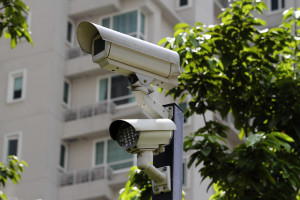 A Jefferson City Police Apartment Security & Safety report warns, “There are some criminals who prey specifically upon apartments and condominiums….You should be aware of, and periodically review, the security and safety of your apartment and apartment building. In rental buildings, the building owner and management are responsible for security.”
A Jefferson City Police Apartment Security & Safety report warns, “There are some criminals who prey specifically upon apartments and condominiums….You should be aware of, and periodically review, the security and safety of your apartment and apartment building. In rental buildings, the building owner and management are responsible for security.”
Apartment complex owners and management companies may implement a variety of security precautions to meet this crucial responsibility. According to JCPD, this duty typically involves:
- ensuring that security systems meet or exceed security requirements for apartment buildings, such as deadbolt locks on doors, good lighting and window locks;
- ensuring that security systems provide reasonable protection for all residents — in their apartments and in common areas, such as parking garages and elevators;
- conducting regular inspections to spot and fix security problems, such as broken locks or burnedout exterior lights, and asking residents to submit security concerns or suggestions as part of continuing maintenance;
- dealing with complaints about dangerous situations, suspicious activities or broken security items.
The Jefferson City Police Department recommends particular attention to the following security measures:
- Apartment Corridor & Balcony Doors
Doors are a burglar’s first choice of entry. Your apartment door should have a good deadbolt lock. One feature to look for is lock throw — the length the locking bolt protrudes from the door into the surrounding door frame when placed in the full lock position. Test this by locking the door while it is open — a good deadbolt lock protrudes 35 mm (1 1∕2 in.) or more when fully extended. A strong deadbolt lock also has a jimmy proof strike plate (the part of the lock assembly mounted in the door frame to receive the bolt). The strike plate should be secured to the door framing by screws at least 50–75 mm (2–3 in.) long. This ensures the strike plate is fastened to the structure of the wall and not just the door frame….Install a door viewer (peephole) in your entrance door, if you do not already have one.
Equip balcony doors with the same type of deadbolt locks recommended for corridor doors. There is special hardware to secure sliding balcony doors but a simple, effective, inexpensive solution is a sturdy piece of wood in the door’s track to prevent the sliding door from opening.
- Windows
Make sure all windows close fully, that the locking hardware is in good condition and that it is easy to lock the window when you shut it. Ensure that a thief cannot lift a horizontal window out of its track.
- Electronic Building Entry Systems
The front door entry system of most apartment buildings allows a resident to remotely let guests into the building. These systems are only effective if the front door locking system functions and intruders cannot take advantage of an open door to enter the building (known as piggybacking).
- Elevators & Lobbies
Elevators and lobbies should be well lit, day and night. Interior lighting in lobbies and corridors should not be on an accessible switch but should instead be controlled by a timer or photocell….Possible hiding places under stairwells should be eliminated. Elevators should be equipped with both a telephone and alarm or duress buttons connected to the resident manager’s unit and an outside central monitoring station. Lobbies should have glass doors, glass in exterior doors and/or side lights.
- Laundry Rooms & Workout Rooms
Laundry rooms in apartment or condominium complexes can represent special security problems. Ideally, the entrance into laundry rooms should be from the exterior of the building and clearly visible. Laundry room door locks should require a tenant or owner key. The laundry room door should have a window in it. A duress alarm and/or telephone should be available in the laundry room. Interior lighting should be wired to remain on permanently during hours of operation. Residents should be encouraged not to use the laundry facilities alone or during late night hours. The same crime prevention or security recommendations applicable to laundry rooms are also applicable to common exercise or workout rooms.
View the complete JCPD Apartment Security & Safety report here.
We are here to Help. Contact us for a Free Consultation.
The Murray Law Firm has extensive and successful experience in representing victims of apartment violence and security negligence in Georgia and we offer our legal expertise, if desired. Anyone seeking further information or legal representation is encouraged to contact us at 888.842.1616. Consultations are free and confidential.
Choosing the Right Attorney
Selecting the right attorney for you or your family is highly important. You must feel confident that the attorney you hire has a complete understanding of the law applicable to your particular case, and has successful experience in handling such cases.
Important: Do not hire a lawyer who has violated the Rules of Professional Conduct!!!
You should not hire an attorney who calls you or visits you unsolicited, or anyone that contacts you directly to offer legal services. This activity is strictly prohibited by Rule 7.3 of the American Bar Association (ABA) Model Rules of Professional Conduct, which states as follows:
 A LAWYER “SHALL NOT” CONTACT A PROSPECTIVE CLIENT THROUGH A “LIVE TELEPHONE” OR AN “IN-PERSON” VISIT.
A LAWYER “SHALL NOT” CONTACT A PROSPECTIVE CLIENT THROUGH A “LIVE TELEPHONE” OR AN “IN-PERSON” VISIT.
– RULE 7.3, ABA MODEL RULES OF PROFESSIONAL CONDUCT.
If an attorney, or someone acting on behalf of an attorney, contacts you in this manner, that attorney is in violation of this Rule. This unethical and unprofessional activity on the part of the lawyer is good sign that you should stay away. It is imperative that you are represented by an attorney who is capable of advocating for you within the confines of the law, and an attorney who fails to abide by the Rules of Professional Conduct is probably not the best fit. In fact, any such attorney should be immediately reported to the local State Bar Association. If you have been contacted in such an unsolicited manner, contact us and we’ll assist you in filing a report.

Contingency Fees Disclaimer: “Contingent attorneys’ fees refers only to those fees charged by attorneys for their legal services. Such fees are not permitted in all types of cases. Court costs and other additional expenses of legal action usually must be paid by the client.”
 Georgia Legal Report
Georgia Legal Report



